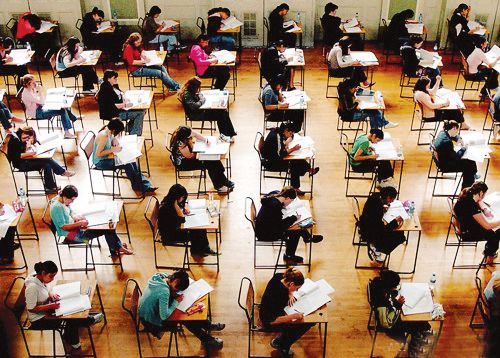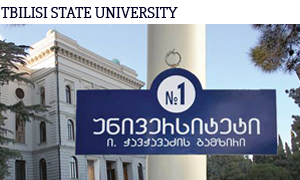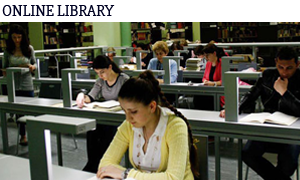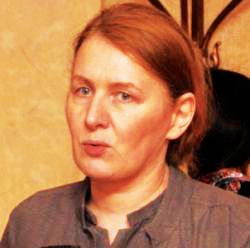
FACULTY OF PSYCHOLOGY AND EDUCATIONAL SCIENCES
The Georgian School System’s Enormous Challenges
According to the Global Competitiveness Index, out of 148 countries, Georgia has a very low rating for education. In the category of universal access to primary education (admissions), Georgia holds 32nd place while quality wise, primary education is only in the 94th place (3,4 points). According to the quality of the education system in general, Georgia is in 105th place (3.2 points), with the quality of mathematical and scientific education in 106th place (3.4 points) (Global Competitiveness Report 2013–2014, World Economic forum).
Accordingly, all research on the Georgian education system, in order to create recommendations, deserves attention. The author carried out international research projects on education in Georgia, and supervised a project that resulted in two major documents: “School Education – The Existing Situation and Analysis’’ and “ The Concept of the Development of School Education’’. The project was funded by the Open Society – Georgia Foundation and the East-West Management Institute (EWMI) project entitled Policy, Advocacy and Civil Society Development in Georgia (G-PAC). Both documents rely on the results of international research carried out in Georgia. In 2013 Ms. Kutaladze also prepared a report on international research, “Literacy: Student Achievement and Related Factors”.
The aim and structure of international research seek to develop and promote education in general. Such research projects are implemented from time to time to monitor and evaluate the changes undertaken in the education system over a specific period of time. Georgia participates in several international research projects: the Progress in International Reading Literacy Study (PIRLS), the Trends in International Mathematics and Science Study (TIMSS) and the Programme for International Student Assessment (PISA). These projects have similar designs--all three are evaluated according to two dimensions: (1) student assessment (testing) to check their progress and (2) factors that affect student performance (education system, school, teacher, family, etc.). With the help of student, teacher and school surveys, there is a lot of data on those factors. Research design and reporting methods are adapted so that governmental institutions find them easy to follow, and to subsequently take research results and recommendations into consideration.
 International research puts particular emphasis on two issues: quality and equality. Student achievement is the main criteria for evaluating a school system. Research results show that most students in Georgia do not even have a minimum of basic skills. For instance, 14% of fourth grade students score lower than standard in reading comprehension (median 5%). Similarly 28% score less than standard in mathematics (international median 10%), and 25% score lower than standard in natural sciences (international median 8%). Georgian students’ performance results in reading, mathematics and natural sciences are far behind the average indicators in West, East and Central Europe and are even lower than the average results of the Commonwealth of Independent States (CIS). Survey results show lower scores at both primary and secondary levels, for example, following TIMSS 2011, 28% of primary school students are unable to do tasks intended for a low level in international performance scales requiring only very basic knowledge. The number of 8th grade students unable to do similar tasks is even higher, at 38%.
International research puts particular emphasis on two issues: quality and equality. Student achievement is the main criteria for evaluating a school system. Research results show that most students in Georgia do not even have a minimum of basic skills. For instance, 14% of fourth grade students score lower than standard in reading comprehension (median 5%). Similarly 28% score less than standard in mathematics (international median 10%), and 25% score lower than standard in natural sciences (international median 8%). Georgian students’ performance results in reading, mathematics and natural sciences are far behind the average indicators in West, East and Central Europe and are even lower than the average results of the Commonwealth of Independent States (CIS). Survey results show lower scores at both primary and secondary levels, for example, following TIMSS 2011, 28% of primary school students are unable to do tasks intended for a low level in international performance scales requiring only very basic knowledge. The number of 8th grade students unable to do similar tasks is even higher, at 38%.
The literacy issues are especially alarming. Progress in International Reading Literacy Study (PIRL) gives the most significant data in this regard. The ability to read is the basis for learning. Accordingly, reading problems cause poor academic performance which makes children fall behind in other subjects. It has been shown that inadequate reading skills for the relative age level are linked to the development of aggressive-violent and antisocial behavior. According to the Programme for International Student Assessment (PISA) data, out of 73 countries, 15-year-old Georgians place extremely low--at 67th place in reading comprehension. Countries with lower points in reading comprehension were Qatar, Panama, Peru, Azerbaijan and Kyrgizstan. Such results definitely point to gross inadequacies in the quality of Georgian school education.
Concerning equal access to education, it is paramount to identify whether the education system offers equal education to all students, irrespective of their social situation. The results of international research show that the differences in student achievement are being increasingly determined by social factors in Georgia. Students who live in villages, who come from poor families or who have less-educated parents (with primary or secondary education only) tend to get lower points than those who live in urban areas and have well-educated parents. Economically disadvantaged students and those in villages are more likely to have fewer educational resources than wealthy students or those living in urban areas. The comparison of international education data from research undertaken in 2006-2007 and 2011 shows that student performance in villages has either deteriorated or remained at the same level, while students living in towns have increased their level of performance. Similar tendencies appear according to the social-economic situation of families where the the gap between wealthy and poor students’ performance levels has significantly increased. Students attending public schools perform more poorly than those from private schools.

Factors contributing to the low quality of school education are first of all a lack of funding, which is one of the most important indicators illustrating the low priority of education for the Government. Education funding is too low in Georgia. Not only is it lower than European countries, the Baltic States and other developed countries, it is even lower than the average funding in post-Soviet countries.
However, even though funding is low, there could have been other positive changes in the system if it had been planned properly. Priorities have been poorly established. Based on the PIRLS 2006 and 2011 research results, safety indicators in Georgian schools are much higher than international average standards. In 2006, according to the students’ survey, Georgia had the highest safety index of all the countries participating in PIRLS research. Only countries like Norway, Sweden and Denmark had a higher safety index. According to the school directors, 73% of students in Georgia were studying in high safety index schools (the international average indicator – 60%) and only 7% attended low safety index schools (international average indicator – 7%). The safety issue could have been addressed only in those schools where safety was an issue. Too much investment was also made in establishing the institution of “resource officers”. The program for hiring foreign English language teachers was allocated 7,797,171 GEL for the 2012 project “Teach and Learn in Georgia”, while first and foremost the priority should have been to raise student achievements in their own language and subjects up to a normal level.
Furthermore, changes made in school education were not synchronized, for example the process of school computerization. In 2006, only 10% of Georgian students had access to computers while today approximately 98% have access. International education research shows that among participating countries, students whose schools are equipped with computers tend to do better in mathematics and natural sciences than those who do not have access to computers. However, in Georgia the opposite is true--students studying in schools with more computer facilities actually perform less well than those who have less access to computers! This strange phenomenon has been caused by how facilities were planned: Parallel to the the provision of computer facilities, it would have been equally important to use these facilities for learning purposes and to integrate computers in the study process. Without proper training for teachers to support the students, and a lack of computer programs relevant to the education plan, the advantage of computerization in the schools was eroded. There should have been much more supporting activities planned with the introduction of computer technologies in school.
Another important problem in Georgian school education is the low competency of most school teachers, illustrated by the results of teacher certification exams. The existing situation shows several interesting, but curious, tendencies identified by the international research studies (TIMSS & PIRLS), which included teachers’ surveys. For instance, Georgian teachers are over-confident in their competency in the knowledge of their subject and pedagogical skills--indeed they far outdistance their colleagues in other countries, who lead based on their students’ achievements. In mathematics Georgian students have far more confident teachers (95%) than students in the leading countries from the TIMSS list (Korea, Singapore, China, Finland)!
Furthermore, Georgian students having teachers with more than 20 years of experience stand out with especially low performance. This seeming incongruity can be explained by a lack of continuing education for Georgian teachers. A teacher requires constant development and knowledge updates, however in Georgia, middle-aged teachers have the lowest degree of motivation for professional development, especially given their low salaries and a number of other factors. Seminars, conferences and professional journals can make a great contribution to teacher development and motivation, yet such resources or training are seriously lacking in Georgia, especially for village teachers.
Due to the low social status of teachers today, it is very hard to attract or keep qualified professionals-- thus the quality of school education is low. School is a vital institution for the education system, and the government should take responsibility first of all for the development of school education. Naturally, the role of universities is also very important. The collaboration between schools and universities should be very close, for example effective and long-term teacher training programs should be designed at the university level. Collaboration between school and university could mean that university education is enhanced through sound practical experience, while the university could support school education with the latest advances in science. Tbilisi State University should contribute to the development of school education by offering effective teacher training programs and teachers’ professional development programs, and by preparing methodological literature. These changes could have a strong impact on the quality of school education and access to effective education.
Several other significant research results make it clear that mathematical and reading skills developed at an early age, as well as the ability to control and retain attention, are vital prerequisites for strong mathematical and reading skills in the future. This is why support from the child’s family is of utmost importance. PIRLS 2011 research once again illustrated the universally known concept that children who are encouraged to learn by their families become good readers. Children who come from families where reading is a part of everyday life and where a child gets constant encouragement to engage in literacy-related activities at an early age (e.g. various types of fun games using letters and words, reading short books and having reading discussions), show high performance in their studies. International research projects also demonstrate that preschool education plays an important role in preparing a child for the school.
International research results can be applied to create a strategic plan to address all the needs of the education system and ensure a high quality of education at all levels. It is necessary to hold public discussions on existing issues in the education system, and to reach an agreement on the important questions of Georgian education reform.




